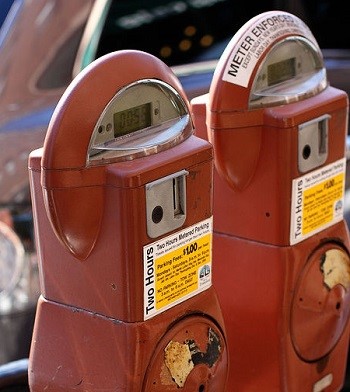A recent investigation from NCC Group has revealed that these applications are vulnerable to being hacked.
Researchers from NCC Group have now completed an investigation that has revealed that there could be greater mobile security concerns associated with parking meter apps than most users likely realize.
The researchers explained that many of these mobile apps are open to cyber attacks from hackers.
Companies using mobile apps to allow people to pay for their parking in the United Kingdom have been doing so in order to offer additional convenience through this alternative method. However, according to this research, the people who are using these apps may also be increasing their risk of mobile security problems. This typically affects people who have smartphones based on the Apple and Android operating systems.
It was the mobile security of the Android applications that underwent the majority of the investigation by NCC.
 The researchers looked into the various kinds of security vulnerabilities that can impact these specific kinds of mobile apps. They wanted to look into those applications as a whole opposed to examining individual apps and labeling them as somehow different than the rest. Therefore, they did not name the specific apps that were studied in the report. Instead, they published their results in general with regards to the paid parking apps in general.
The researchers looked into the various kinds of security vulnerabilities that can impact these specific kinds of mobile apps. They wanted to look into those applications as a whole opposed to examining individual apps and labeling them as somehow different than the rest. Therefore, they did not name the specific apps that were studied in the report. Instead, they published their results in general with regards to the paid parking apps in general.
The assessment of the security of these apps was focused on the amount of attack surface that was available on Android based smartphones, including the vendor’s APK and any data that would be stored on the mobile device because of the interactions with the online support servers. At the same time, throughout this research, there was no time at which investigations were made into problems that could result from manipulating data sent to the server. Therefore, this research did not represent the same level of results that would have been achieved if the apps had undergone thorough penetration testing.
The mobile security conclusion of the team at NCC was that almost all the applications they investigated had been “affected by security vulnerabilities – some more serious than others.” They pointed out that their cryptographic implementation mediocrity was among the most common trends from one to the next.
BWild |
December 24, 2014
A recent report has shown that device users appear to be relatively apathetic about efforts to protect their smartphones.
According to the results of a recent study that were published within a report, users of devices based on both the Android and iOS platforms have a higher fraud rate than the typical consumer, simply because they have not taken adequate mobile security precautions in their overall security and password habits.
Despite the fact that consumers are using their smartphones for transactions with personal data, they appear unconcerned.
Personal identifiable information (PII) is being regularly placed at risk by consumers who are using their smartphones and tablets to conduct a range of different transactions, but at the same time, they appear to be apathetic when it comes to actually taking mobile security measures that would help to protect that sensitive data. A Javelin Strategy & Research study has shown that as a result of this consumer apathy, a world of opportunity has been opening up for cyber criminals.
The mobile security report involved the participation of 5,643 American adults in a survey.
 The report on the survey results was entitled “Smartphones, Tablets and Fraud: When Apathy Meets Security”. It was sponsored by Nok Nok Labs, an authentication technology provider. The participants in the study were all from the United States and were all over the age of 18 years.
The report on the survey results was entitled “Smartphones, Tablets and Fraud: When Apathy Meets Security”. It was sponsored by Nok Nok Labs, an authentication technology provider. The participants in the study were all from the United States and were all over the age of 18 years.
The insight offered by this report was primarily to do with the increasing reliance of consumers on their mobile devices in order to be able to stay connected, keep up with their social media, access their email, and conduct various forms of transactions through the internet and a range of different apps. It pointed out that any one of those activities can hand cyber-criminals an opportunity with varying degrees of value in terms of personally identifiable information and account data that could either be misused or sold so that someone else could misuse it.
Regardless of this fact, the study showed that many consumers don’t come nearly close enough to taking the necessary efforts to protect themselves against mobile security breaches. The study revealed that about 6 out of every ten mobile device users use the same password over several different accounts on their device. That, alone, offers considerable exposure to cyber threats.
 The researchers looked into the various kinds of security vulnerabilities that can impact these specific kinds of mobile apps. They wanted to look into those applications as a whole opposed to examining individual apps and labeling them as somehow different than the rest. Therefore, they did not name the specific apps that were studied in the report. Instead, they published their results in general with regards to the paid parking apps in general.
The researchers looked into the various kinds of security vulnerabilities that can impact these specific kinds of mobile apps. They wanted to look into those applications as a whole opposed to examining individual apps and labeling them as somehow different than the rest. Therefore, they did not name the specific apps that were studied in the report. Instead, they published their results in general with regards to the paid parking apps in general.
 The report on the survey results was entitled “Smartphones, Tablets and Fraud: When Apathy Meets Security”. It was sponsored by Nok Nok Labs, an authentication
The report on the survey results was entitled “Smartphones, Tablets and Fraud: When Apathy Meets Security”. It was sponsored by Nok Nok Labs, an authentication 